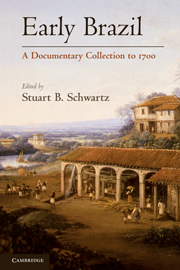Book contents
- Frontmatter
- Contents
- Preface
- A Note on Translation
- A Note on Portuguese Currency, Weights, and Measures
- Maps
- 1 The “Discovery” and First Encounters with Brazil
- 2 The Donatarial System
- 3 Royal Government
- 4 The French Interlude
- 5 Indians, Jesuits, and Colonists
- 6 The World of the Engenhos
- 7 Government and Society in Dutch Brazil
- 8 Burdens of Slavery and Race
- 9 Public and Private Power
- 10 Religion and Society
- 11 Frontiers
- Index
11 - Frontiers
Published online by Cambridge University Press: 05 June 2012
- Frontmatter
- Contents
- Preface
- A Note on Translation
- A Note on Portuguese Currency, Weights, and Measures
- Maps
- 1 The “Discovery” and First Encounters with Brazil
- 2 The Donatarial System
- 3 Royal Government
- 4 The French Interlude
- 5 Indians, Jesuits, and Colonists
- 6 The World of the Engenhos
- 7 Government and Society in Dutch Brazil
- 8 Burdens of Slavery and Race
- 9 Public and Private Power
- 10 Religion and Society
- 11 Frontiers
- Index
Summary
Although the heartland of the Portuguese colony of Brazil remained the coastal strip, by the seventeenth century, slave hunting, cattle ranching, and prospecting had opened up small settlements and trails into the interior. On the perimeter of the major areas of settlement, a number of kinds of frontiers developed. The northern captaincies of Maranhão and Pará constituted a separate colony in many ways. They had been the target of French, Spanish, and other European projects at colonization, but with the foundation of cities such as São Luiz (1614) and Belem (1616), a Portuguese presence was fully established, and the area was created as a separate administrative unit, the State of Maranhão, in 1621. Despite that action, the European population remained small because these areas continued to be something of an economic backwater, even though attempts were made there to develop sugar plantations. Colonists remained dependent on Native American workers and thus clashed with the missionaries in the region, repeating in a way the struggles between colonists and Jesuits that had characterized the Brazilian coast in the sixteenth century. The Jesuits replaced the Franciscans as the major missionary order in the region in the 1640s. They led a campaign against colonist abuses that resulted in a 1655 law limiting enslavement of Indians, but this legislation was ineffective, and the struggle continued between missionaries and colonists well into the following century. Jesuit Father Antônio Vieira, author, preacher, diplomat, and missionary, was sent to Belem as Jesuit Provincial in 1652. His letter to the Crown translated here makes clear the region's problems.
Another kind of frontier developed in the interior. Westward from the coastal settlements of Brazil, especially in the northeastern captaincies of Bahia and Pernambuco, cattlemen had opened up vast stretches of the arid backlands or sertão, sometimes creating properties of great size. Large drives of cattle brought the livestock down to the coast to supply the needs of the colony as described in document 2 and, in doing so, expanded the scope of the colony.
It was, however, the search for precious metals that finally moved the population inland on a large scale. Travelers, colonists, and royal officers had long searched for gold or other precious metals. Companies of trailblazers and backwoodsmen had traversed the interior in search of mineral wealth and of Native Americans who could be used as workers. Setting out from São Paulo and from other towns, these men explored the interior and pushed the frontier of occupation westward. By the 1670s, with the sugar economy in decline, the search for precious metals became intense, but it was only in 1695 that relatively large strikes were made in the mountainous area called Minas Gerais. Gold fever swept through the colony and the empire. Neither Brazil nor the Portuguese empire would ever be the same again. The most famous early account of the mining region was penned by André João Antonil (Giovanni Antonio Andreoni), an Italian Jesuit who came to Brazil in 1681 and became Provincial of Order and rector of the Jesuit College of Salvador. In 1711, he publishedCultura e opulência do Brasil por suas drogas e minas, an analysis of the major economic activities in Brazil including the newly discovered mines, but his descriptions of the routes to the mines were so accurate that the book was banned and almost all the existing copies destroyed.
The State of Maranhão: A Letter from Father António Vieira S.J. (1653)
(From J. Lúcio de Azevedo, ed., Cartas do Padre António Vieira, Lisbon, vol. 1 (1970), pp. 296–305).
- Type
- Chapter
- Information
- Early BrazilA Documentary Collection to 1700, pp. 289 - 304Publisher: Cambridge University PressPrint publication year: 2009

